Israel's Netanyahu projected to fall short of majority in 4th election in 2 years
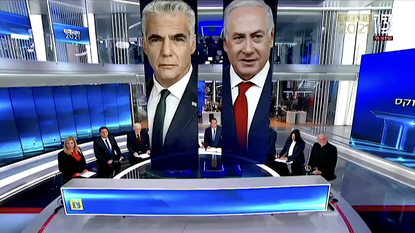

Israel's polarized, dispirited electorate did not deliver Prime Minister Benjamin Netanyahu the victory he had hoped for in elections Tuesday, and exit polls suggest his right-wing bloc fell short of a majority in the 120-seat Knesset, or parliament. Netanyahu and his allies are projected to win 52 or 53 seats, while the ideologically diverse group of parties opposed to Netanyahu look set to have 60 seats. The remaining votes will go to Yamina, the party led by former Netanyahu ally Naftali Bennett, who has positioned himself as the key swing vote.
This was Israel's fourth national election in two years, and the split decision Tuesday could mean a fifth election. Netanyahu, Israel's longest-serving leader, has led the last four series of unstable governments. He campaigned this time on Israel's successful COVID-19 vaccination campaign and a series of agreements with Arab countries. Netanyahu's opponents argue he shouldn't be allowed to lead Israel while standing trial on criminal corruption charges.
It the exit polls are correct, Netanyahu would not have a majority even if Bennett's Yamina party joins his right-wing coalition. But it will also be hard for his main opponent, Yair Lapid of the centrist Yesh Atid party, to find common ground to form a government with the other anti-Netanyahu parties. Still, Axios says, "those parties could potentially pass a law, targeting Netanyahu, to ban anyone under a criminal indictment to serve as prime minister."
Subscribe to The Week
Escape your echo chamber. Get the facts behind the news, plus analysis from multiple perspectives.

Sign up for The Week's Free Newsletters
From our morning news briefing to a weekly Good News Newsletter, get the best of The Week delivered directly to your inbox.
From our morning news briefing to a weekly Good News Newsletter, get the best of The Week delivered directly to your inbox.
"I have already begun this evening to hold talks with some of the leaders of the bloc for change and will continue in the next few days," Lapid said. A subdued Netanyahu addressed supporters early Wednesdays, touting his Likud party's "great achievement" but not declaring victory. "We must not under any circumstances drag the state of Israel to new elections, to a fifth election," he said. "We must form a stable government now." After Netanyahu's brief remarks, the room cleared pretty quickly and one of the cleaning crew pulled the string to release the balloon drop.
"All three options are on the table: a Netanyahu-led government, a change coalition that will leave Netanyahu in the opposition, and an interim government leading to a fifth election," Yohanan Plesner, president of the Israel Democracy Institute, tells The Associated Press.
Create an account with the same email registered to your subscription to unlock access.
Sign up for Today's Best Articles in your inbox
A free daily email with the biggest news stories of the day – and the best features from TheWeek.com
Peter has worked as a news and culture writer and editor at The Week since the site's launch in 2008. He covers politics, world affairs, religion and cultural currents. His journalism career began as a copy editor at a financial newswire and has included editorial positions at The New York Times Magazine, Facts on File, and Oregon State University.
-
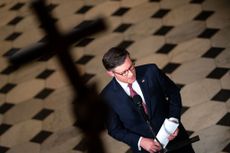 'A speaker courageous enough to stand up to the extremists in his own party'
'A speaker courageous enough to stand up to the extremists in his own party'Instant Opinion Opinion, comment and editorials of the day
By Harold Maass, The Week US Published
-
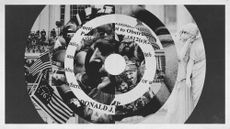 How could the Supreme Court's Fischer v. US case impact the other Jan 6. trials including Trump's?
How could the Supreme Court's Fischer v. US case impact the other Jan 6. trials including Trump's?Today's Big Question A former Pennsylvania cop might hold the key to a major upheaval in how the courts treat the Capitol riot — and its alleged instigator
By Rafi Schwartz, The Week US Published
-
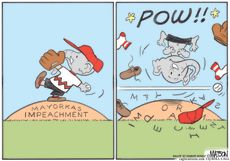 Today's political cartoons - April 18, 2024
Today's political cartoons - April 18, 2024Cartoons Thursday's cartoons - impeachment Peanuts, record-breaking temperatures, and more
By The Week US Published
-
 Mark Menzies: Tories investigate MP after 'bad people' cash claims
Mark Menzies: Tories investigate MP after 'bad people' cash claimsSpeed Read Fylde MP will sit as an independent while party looks into allegations he misused campaign funds on medical expenses and blackmail pay-out
By Arion McNicoll, The Week UK Published
-
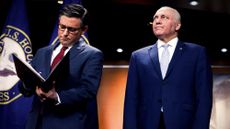 Why Johnson won't just pass Ukraine aid
Why Johnson won't just pass Ukraine aidSpeed Read The House Speaker could have sent $60 billion in military aid to Ukraine — but it would have split his caucus
By Peter Weber, The Week US Published
-
 Sudan on brink of collapse after a year of war
Sudan on brink of collapse after a year of warSpeed Read 18 million people face famine as the country continues its bloody downward spiral
By Peter Weber, The Week US Published
-
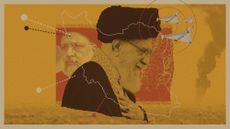 How powerful is Iran?
How powerful is Iran?Today's big question Islamic republic is facing domestic dissent and 'economic peril' but has a vast military, dangerous allies and a nuclear threat
By Harriet Marsden, The Week UK Published
-
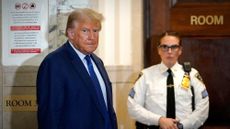 Trump's first criminal trial starts with jury picks
Trump's first criminal trial starts with jury picksSpeed Read The former president faces charges related to hush money payments made to adult film star Stormy Daniels
By Peter Weber, The Week US Published
-
 How will Israel respond to Iran's direct attack?
How will Israel respond to Iran's direct attack?Speed Read Iran’s weekend attack on Israel could escalate into a wider Middle East war
By Peter Weber, The Week US Published
-
 US, Israel brace for Iran retaliatory strikes
US, Israel brace for Iran retaliatory strikesSpeed Read An Iranian attack on Israel is believed to be imminent
By Peter Weber, The Week US Published
-
 Congress honors real-life Rosie the Riveters
Congress honors real-life Rosie the RivetersSpeed Read These American women reshaped the work force during World War II
By Peter Weber, The Week US Published